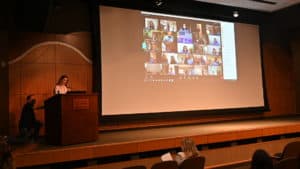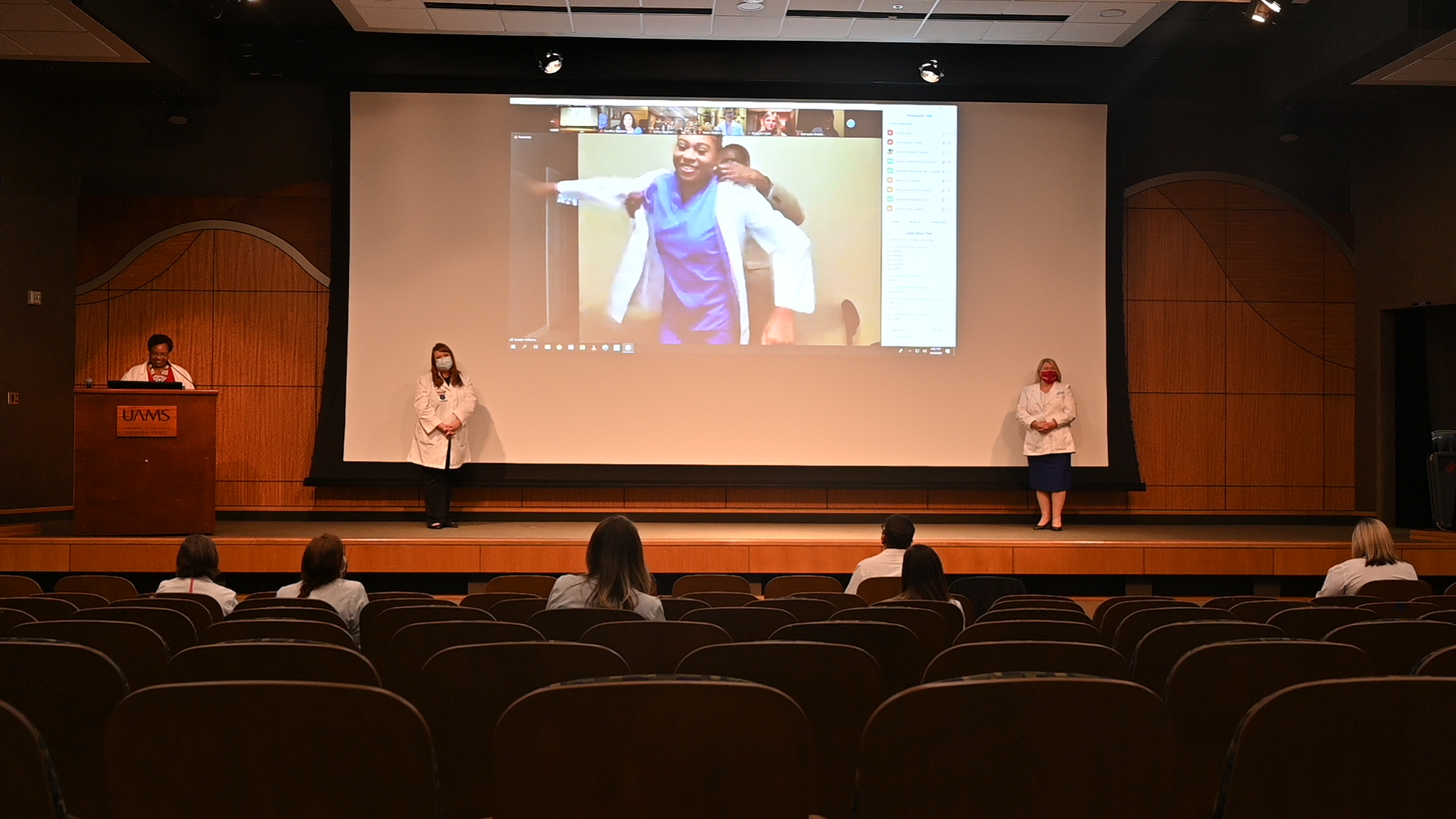Nursing Students Don White Coats as They Transition to Patient Care
| Smiling faces projected onto an enormous screen took the place of the traditional in-person ceremony Oct. 9 as students working to earn a bachelor’s degree in nursing put on their white coats for the first time.
The coats symbolize their transition from learning the methods and mastering the skills of nursing to applying that knowledge to real patients.

Ava Coleman, of the College of Nursing, snaps a photo as Patricia Cowan, Ph.D., RN, addresses the assembled faculty and nursing students attending remotely.
“Tonight’s white coat ceremony marks the passage of these students from non-clinical work and skills mastery to interacting with patients and families in the clinical setting. I know they are excited to begin this part of their education,” said Patricia Cowan, Ph.D., RN, dean of the UAMS College of Nursing.
The ceremony was held virtually, with only nursing faculty attending in the auditorium of the Jackson T. Stephens Spine & Neurosciences Institute due to attendance restrictions required by the COVID-19 pandemic. Students connected by video conference and donned their white coats surrounded by – and with the help of – family, friends or coworkers as faculty applauded their accomplishment from campus.
“Even though we can’t celebrate together today and shake hands or hug as you celebrate and put on your white coat, know that we are virtually celebrating with you. One day we’ll get to celebrate together again the way we should and the way we all want to,” said Trenda Ray, Ph.D., RN, UAMS chief nursing officer, in a recorded video message.
Before putting on their white coats, students recited the Florence Nightingale Pledge, led by BSN student and senior class president Taylor Moll, promising to “faithfully practice the profession of nursing … maintain the highest standards of practice … hold in confidence all personal matters committed to my keeping … devote myself to the welfare of my patients, their families and my community” and “constantly endeavor to increase my knowledge and skills in nursing and use them wisely.”
A short “hello” from each student allowed them to be on camera as they put on their white coat. A quick mute afterward hushed the cheers of their surrounding supporters and allowed the next student to take center stage as the ceremony progressed through all 108 nursing students in attendance.

Nicole Ward, Ph.D., APRN, RN, director of the BSN program, praises the adaptation of nursing students as they learn through the pandemic.
Nicole Ward, Ph.D., APRN, RN, director of the BSN program, noted the unique nature of this year’s ceremony and its importance to those pursuing a career in nursing.
“So far as nursing students, you have checked one really important box for nursing, and that is adaptability. Nurses have to be masters at adaptation. We make split second decisions with grace and confidence, and no other nursing students we have taught until now have had to learn this lesson so quickly. Embrace it. It will serve you very well in your career as a nurse.”
She also noted that the experience of learning during a pandemic will help students in other ways.

Taylor Moll, BSN student and senior class presidents, leads students participating in the white coat ceremony as they take the Florence Nightingale Pledge.
“You will also learn how to innovate. I have no doubt that in this group of students there are some really brilliant minds. You will come up with innovations that change the way we deliver care. We will teach you how to evaluate the evidence for why we do things, but it’s ok to question. That’s where innovation comes from.”
The importance of acquiring those skills as students transition into clinical care is hard to overstate because of the role nurses play, said Cowan.
“Nurses are the backbone of the health care profession in the United States. They serve a critical role in every health care setting. Most of us will receive health care from a nurse many times throughout our lives, and nearly all of us will have a nurse care for a loved one,” she said. “Nurses are present throughout people’s lives, from birth to adulthood and at the end of life.
“Few professionals are as fortunate as nurses in being able to touch lives so profoundly.”
